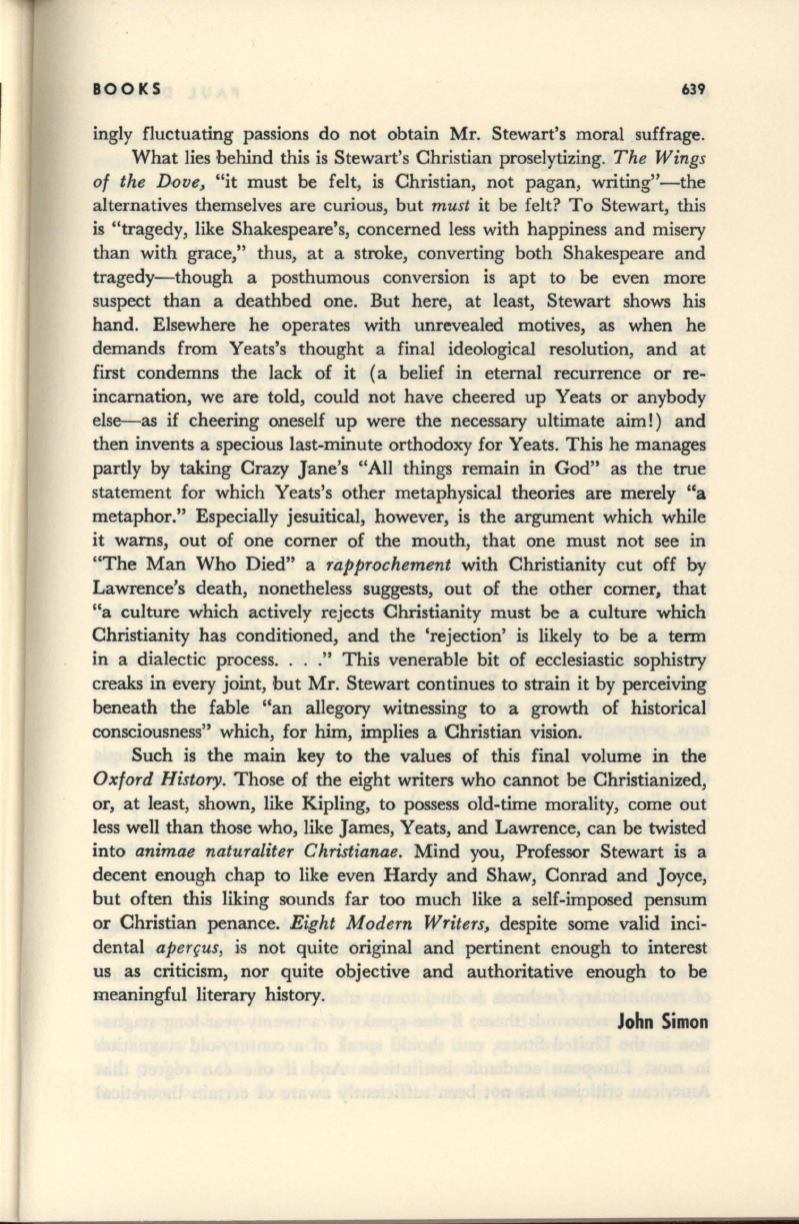

BOOKS
639
ingly fluctuating passions do not obtain Mr. Stewart's moral suffrage.
What lies behind this is Stewart's Christian proselytizing.
The Wings
of the Dove,
"it must
be
felt, is Christian, not pagan, writing"-the
alternatives themselves are curious, but
must
it be felt? To Stewart, this
is
"tragedy, like Shakespeare's, concerned less with happiness and misery
than with grace," thus, at a stroke, converting both Shakespeare and
tragedy-though a posthumous conversion
is
apt to be even more
suspect than a deathbed one. But here, at least, Stewart shows his
hand. Elsewhere he operates with unrevealed motives, as when he
demands from Yeats's thought a final ideological resolution, and at
first condemns the lack of it (a belief in eternal recurrence or re–
incarnation, we are told, could not have cheered up Yeats or anybody
else--as if cheering oneself up were the necessary ultimate aim!) and
then invents a specious last-minute orthodoxy for Yeats. This he manages
partly by taking Crazy Jane's "All things remain in God" as the true
statement for which Yeats's other metaphysical theories are merely "a
metaphor." Especially jesuitical, however, is the argument which while
it warns, out of one comer of the mouth, that one must not see in
"The Man Who Died" a
rapprochement
with Christianity cut off by
Lawrence's death, nonetheless suggests, out of the other comer, that
"a culture which actively rejects Christianity must
be
a culture which
Christianity has conditioned, and the 'rejection'
is
likely to
be
a term
in a dialectic process...." This venerable bit of ecclesiastic sophistry
creaks in every joint, but Mr. Stewart continues to strain it by perceiving
beneath the fable "an aIIegory witnessing to a growth of historical
consciousness" which, for him, implies a Christian vision.
Such is the main key to the values of this final volume in the
Oxford History.
Those of the eight writers who cannot be Christianized,
or, at least, shown, like Kipling, to possess old-time morality, come out
less well than those who, like James, Yeats, and Lawrence, can be twisted
into
animae naturaliter Christianae.
Mind you, Professor Stewart is a
decent enough chap to like even Hardy and Shaw, Conrad and Joyce,
but often this liking sounds far too much like a self-imposed pensum
or Christian penance.
Eight Modern Writers,
despite some valid inci–
dental
aper~us,
is not quite original and pertinent enough to interest
us as criticism, nor quite objective and authoritative enough to be
meaningful literary history.
John Simon









